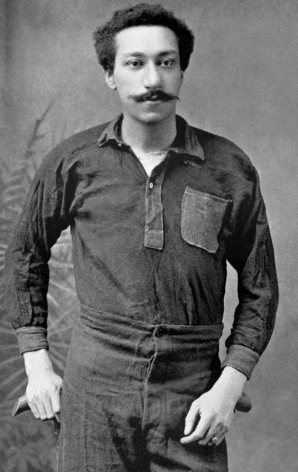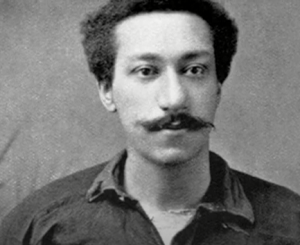Who was Arthur Wharton? Life, Influence & Legacy

Arthur Wharton: history, influence and legacy on and off the pitch
Arthur Wharton’s life and achievement have inspired many black soccer players over the years. He was probably the reason why players such as Edson Arantes do Nascimento (Pelé), George Weah, and Kylian Mbappé have excelled in the sport. The Gold Coast-born British soccer player is widely recognized as the first black person to play the game at the professional level.
Though he was mostly used as a goalkeeper, Wharton occasionally operated as a winger. This is something that not many goalkeepers in the modern era can do. Despite making a name for himself as a soccer player, Wharton was admired for his numerous talents. He also performed brilliantly in other sports such as cricket, rugby, running, and cycling.
An FA Cup participant, the renowned goalkeeper was a sporting pioneer whose place in the history books cannot be ignored.
In this article, World History Edu looks at the extraordinary life of this soccer legend and what his achievement means to other black players in the sport.
Arthur Wharton as a child
Wharton was raised in Jamestown in Gold Coast (modern-day Ghana). He was the son of Annie Florence Egyriba, a royal of the Fante tribe in Ghana, and Henry Wharton, a missionary from Grenada.
His father, who was half-Scottish half Grenadian, was the son of a very affluent Scottish merchant. His mother was half Scottish half Ghanaian.
Wharton spent his early youth in Ghana, attending Mfantsipim School, the renowned all-boys secondary school in Cape Coast. Established by the Methodist Church in the 1876, the school can boast of many distinguished alumni, including former UN Secretary-General Kofi Annan.
It is believed that he was born into quite a wealthy family. This was probably why he was flown to Great Britain in 1882 to start his missionary training at Darlington’s Cleveland College.
His early years in England
Wharton changed his plans when he got to England. He shifted his attention from being a missionary to being a sportsman.
He participated in a number of amateur competitions and equaled the world record in the 100-yard heat at Stamford Bridge on 3 July 1886. The record stood for over three decades.
Soon after establishing himself as one of the fastest athletes at the amateur level, Wharton tested himself in other sporting events.
As a cricketer, he starred for many teams including Lancashire and Yorkshire. He was also a fan of cycling and won many popular competitions. His love for sports leads us to his next adventure which is soccer.

Wharton signed a professional contract with Rotherham Town in 1889. He then went on to play for Sheffield United FC in South Yorkshire, England. In the 1894/95 season, he became the first black footballer to play in the top division of English football.
The beginning of his soccer career and how he made history
Many soccer players developed a love for the sport at an early age and Wharton was no exception. He decided to go into the sport in 1885 when he was around 20 years old.
He initially joined Darlington as one of their amateur goalkeepers. He recorded many splendid performances, and after a year, he was signed to the junior team of Preston North End. He contributed to the team’s run to the semi-finals of the FA Cup in 1886/87.

Born in the British West African colony of Gold Coast (modern day Ghana), Arthur Wharton was the world’s first black professional footballer. Image: Wharton (seated second from left on front row) while playing (amateur) for Darlington F.C. (1887)
Faced with limited game time, Wharton decided to take a break from soccer and go back to athletics. His unwillingness to fight for his place in the team was perhaps one of his weaknesses as a multi-talented sportsman.
He came back to the game in 1888 when he featured for Sheffield Wednesday in a friendly game against his former team, Preston North End. His side lost 8-1 and Wharton received lots of bashing from the media and some fans who described his performance as “horror”.
The following year saw him etch his name in history. By signing his first professional contract with Rotherham Town, the Jamestown-born goalkeeper became the first black soccer player to star at the professional level.
Though Scotland’s Andrew Watson and Robert Walker had already played the game, none of them got to the professional stage before Wharton.
He made over a dozen appearances during his five years spell at Rotherham. His performances earned him a deal with Sheffield United in 1894. He was signed as a backup to the famous William Foulke.
It was during his time at Bramall Lane that he became the first player with a mixed-heritage to feature in England’s top flight league.
A year later, he returned to Rotherham before joining Stalybridge Rovers for the 1896/1897 season. After some misunderstanding with the team’s management, Wharton left to join Ashton North End in 1897.
He ended his playing career in 1902 as a player of Stockport County.
What made him so special?
Though he wasn’t the greatest goalkeeper of his era, Wharton was special in his own right. Imagine having a goalkeeper with good reflexes and superhuman speed. These were some qualities of the former Rotherham Town shot stopper.
Before Columbia’s Rene Higuita’s famous scorpion-kick, there was Wharton’s “monkey save”. With this style, the British goalkeeper would grab the ball between his thighs while holding on to the crossbar. This style is so difficult that modern-day goalkeepers will never dream of repeating.
With the level of entertainment that he brought to the game, Wharton was admired by many soccer lovers in the United Kingdom. His works on and off the pitch inspired future generations of players, especially Black Britons, to come.

His campaign off the pitch inspired a whole lot of people to take the sport and follow in his footsteps. Simply put, he was a vocal voice in the community, offering help to people in need. Image: Mural of Arthur ‘Kwame’ Wharton
How his life turned out after his soccer career
Unlike many soccer players of the modern-era, Wharton didn’t make a lot of money from his playing days.
It’s said that he earned about £3 a week (£400 in today’s money). It’s also said that he gave a significant portion of his wages to those in need.
We won’t be exaggerating when we say he was penniless after hanging his boots. In order to make ends meet, Wharton got a job at a local coal mine where he worked as one of their haulers.
Despite the difficulties, Wharton was very patriotic. His love for his country was one of the reasons why he became a member of the Volunteer Training Corps. Through the service, he fought in the First World War.
The ex-soccer star struggled with life during his later years. He became increasingly unhappy due to economic hardship. He later turned to alcoholism as a way out, but that proved to be a very bad decision.
Battle with syphilis and death

For his contributions on and off the pitch, In 2003, Arthur Wharton was posthumously inducted into the English Football Hall of Fame. Image: Arthur Wharton in later years
In addition to his financial problems, Wharton also battled many illnesses during his last years. Perhaps he would have lived a bit longer if he had all the money to take care of his medical bills.
At a stage in his life, he was diagnosed with syphilis. Aside from that, he also developed epithelioma. Fighting these illnesses was never easy for the once famous soccer star. He gave up the ghost on December 13, 1930, aged 65. The former Sheffield United shot stopper was buried in an unmarked grave in South Yorkshire.
It was not until 1997 that his grave received a headstone. The initiative was championed by an anti-racism group, Football Unites, Racism Divides.

Tombstone of Arthur Wharton
Recognitions
Despite being a trailblazer in the sport, Wharton didn’t receive the recognition he deserved.
It was not until 2003 that the legendary goalkeeper was named into the English Football Hall of Fame.

Despite facing almost insurmountable challenges and racial barriers, Wharton followed his passion and etched his name in English football. Image: A plaque recognizing his contribution to professional sport.
In 2012, a mini statue of the former goalkeeper was given to Sepp Blatter, then-president of the world’s governing football body, FIFA.
In 2013, he was honored at England Athletics’ Hall of Fame Awards.
Perhaps the most memorable edifice in honor of his remarkable contributions to professional sports is the 16ft bronze statue at the FA’s National Football Center in Burton. Inspired by the tireless effort of Shaun Campbell of the Arthur Wharton Foundation, the statue was unveiled in 2014.

The 16ft bronze statue of Ghanaian-born British footballer Arthur Wharton at the National Football Center of the English Football Association.
What is the Arthur Wharton Foundation?
In order to make his achievements known to later generations, Shaun Campbell, a popular businessman, established the Arthur Wharton Foundation in 2010. Aside from promoting the works of the former goalkeeper, the foundation is also focused on fighting racism and promoting culture diversity.
Which other popular sports personnel has he influenced?
Many black sportsmen and women have looked up to Wharton. In an interview, Jamaican sprinter Usain Bolt stated that “Without Arthur, there would be no Usain Bolt”. According to Campbell, other famous soccer players such as England’s Marcus Rashford and Les Ferdinand have all been touched by the works of Wharton.
With his remarkable achievement and the amount of impact that he has had on other celebrated soccer players, we can boldly say that Arthur Wharton was indeed an incredible human being who has rightfully earned his place in the history books.

Usain Bolt on Arthur Wharton
Arthur Wharton: Fast Facts

Arthur Wharton was a really good goalkeeper, perhaps one of the best in his time. His story has served as a big inspiration to many footballers, including Rio Ferdinand, Theo Walcott, and Marcus Rashford. His athletic prowess inspired multiple Olympic gold medalist Usain Bolt.
Name at birth: Arthur Kwame Burton
Born: October 28, 1865
Place of birth: Jamestown, Accra, Ghana (formerly Gold Coast)
Died: December 13, 1930
Place of death: Edington, Yorkshire, England
Parents: Henry Wharton and Annie Florence Egyriba
Spouse: Emma Lista (married in 1890)
Football career
Positions played: Goalkeeper/Winger
Notable Teams played for (amateur): Darlington FC, Preston North End
Notable Teams played for (professional): Rotherham Town, Sheffield Town



























